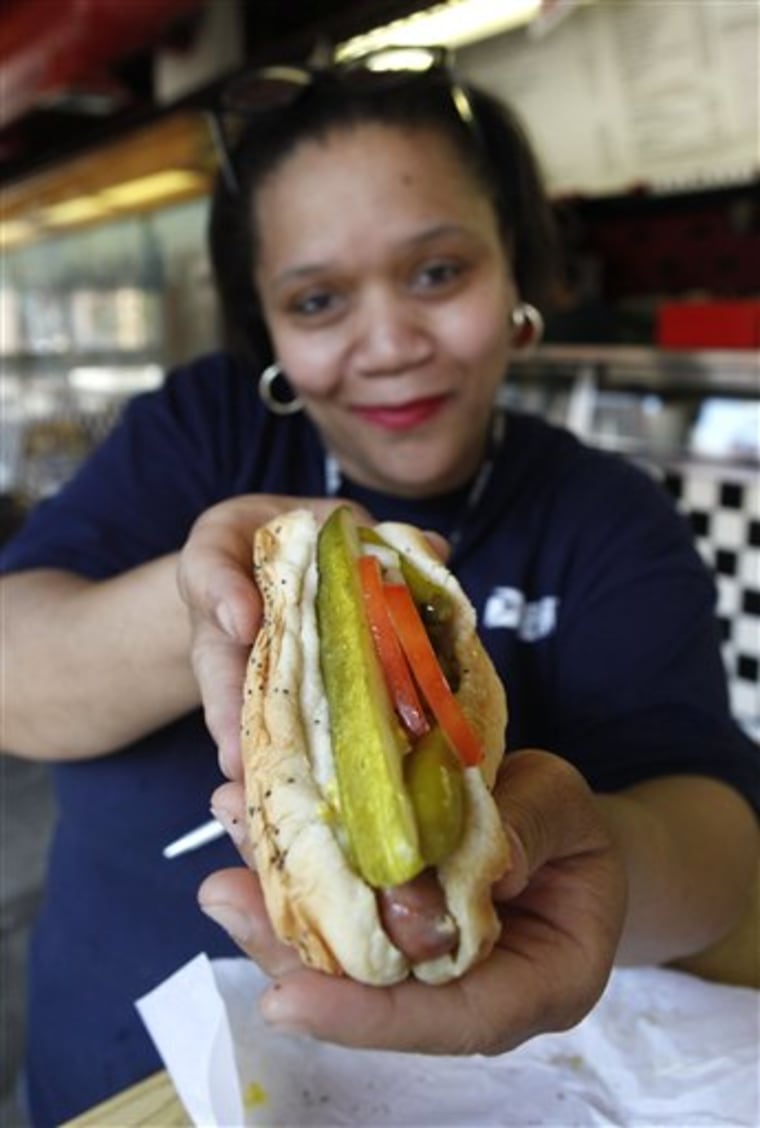This is a dog fight Chicago will relish.
Vienna Beef, one of the world's most famous hot dog makers, is suing the owner of a rival hot dog company, accusing him of either stealing Vienna's 118-year-old recipe or lying to customers by claiming that he's using it.
The rival is none other than a grandson of one of the two men who founded the company after their hot dogs became a hit at the 1893 World's Fair.
In this wiener war, one of the only things the owners of Vienna Beef and Red Hot Chicago are likely to agree on is that you don't put ketchup on a Chicago-style hot dog.
They also might agree that Chicago's dog — with its mustard, bright green relish, tomato slices, pickle spear, chopped onion and more — is far superior to New York's grilled or boiled dog, which by Chicago standards is practically naked with only sauerkraut and mustard.
The lawsuit accuses Red Hot Chicago of false advertising, unfair competition and trademark infringement. But it also offers a reminder that hot dogs are no joking matter in Chicago, where the "meal on a bun" is part of local history and where loyalty to one of the region's 2,000 hot dog stands is passed down from generation to generation.
"This is Chicago, and we take hot dogs seriously," said Tanya Russell, a mail carrier who stopped at Fast Track, a downtown stand, to deliver some letters and grab a Vienna hot dog before finishing her route.
The fight could be a long one, in large part because of the legacy at stake.
Scott Ladany's grandfather arrived as an immigrant from Austria-Hungary and set up a hot-dog cart at the World's Fair. At the time, he "started with little more than hopes, dreams and his sausage-making skills," attorney Jami Gekas wrote.
The grandfather, Samuel Ladany, eventually helped found the business that is now Vienna Beef. Fast forward to the early 1980s, when Scott Ladany was leaving the company. He sold his 10 percent stake and agreed not to "use or divulge" any of Vienna's recipes and, according to the lawsuit, promised not to compete with Vienna for at least 2½ years.
In 1986, after that condition expired, he founded Red Hot Chicago.
Ladany has declined to comment, but in court documents he insists he did not steal anything and that Red Hot's recipe is its own. At the same time, he always made it clear that his family history — complete with the World's Fair photographs and pictures of his grandfather that Vienna had showcased — were going to take center stage at Red Hot Chicago, too.
So, not only did he settle on "A Family Tradition Since 1893" as his company motto, but he also included Vienna Beef's name right in his advertising literature.
And the reason, Gekas, told the judge, is simple: It's all true.
Vienna Beef CEO Jim Bodman says he worries that the messages will confuse customers.
"He was dancing right up to the line by saying it's a family tradition," Bodman said.
"They want to ride Vienna's coattails ... and sell their product using Vienna's brand recognition," Vienna's attorney, Phillip Reed, said recently at a court hearing.
Even the judge handling the case wondered if all the talk about history might mislead customers.
"Isn't there an implication ... that this is one big hot dog family?" asked U.S. District Judge Sharon Johnson Coleman.
It isn't.
Bodman said he's been aggravated for years by Red Hot's advertising. Then, a few months ago, Red Hot began advertising that it was using a "time-honored family recipe" that's more than a century old — a claim that appeared in print in a food industry magazine.
"That goes over the line," he said, explaining the lawsuit filed this month.
The way hot dog makers see it, recipes are the key to success, just like the formula for Coca-Cola and the secret spices that go into KFC chicken.
Alex Lazarevski of Express Grill in Chicago said that while he has someone else make his sausages, he hires that person to do so with the seasonings that the hot dog stand owner gives him, already mixed.
"I don't want anybody else to get a hold of it," said Lazarevski, who says the recipe is patented.
Vienna's 118-year-old recipes are so important to the company that for years they were kept in a vault. And even today, outside vendors who mix the spices and oils "only handle a portion of the blending process."
That way, "neither vendor knows the entire process, blend and formulation of the Vienna Recipes," according to the lawsuit.
At a recent hearing, Gekas acknowledged that it was a "mistake" for Red Hot to suggest at one point that it had a recipe dating back to the 1800s. But she said the mistake was made by a "marketing person" and it was made only once.
Vienna's Reed has acknowledged a mistake of his own.
In a court document filed Friday, he backed away from one of the complaint's most explosive allegations: That Ladany or his representatives either lied to hot dog vendors, saying that their hot dogs used Vienna's recipe, or asked them to buy the cheaper dogs and pass them off as Vienna products to their customers.
Gekas, who disputed that contention in court, would not comment on Vienna's latest document. But at the hearing, she kept returning to the same point: Ladany is not trying to trick anybody when it comes to his background or his company's history.
"What he is doing is sending a different message: 'I know what I'm doing. I grew up in the business,'" she said. Ladany, she wrote in one document, "represents true Chicago hot dog tradition."
